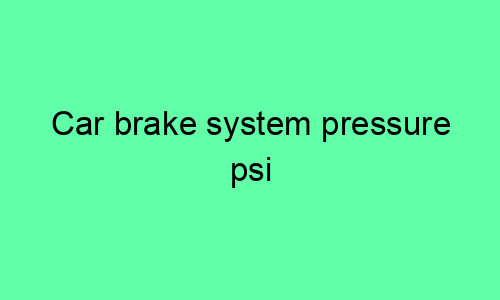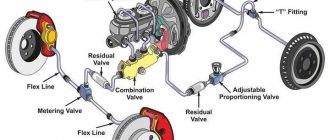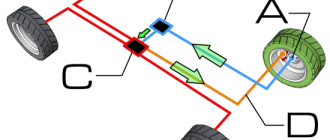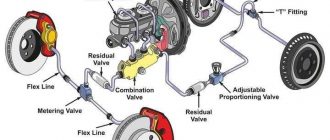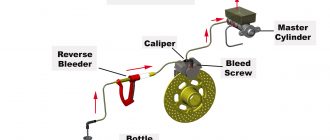## Car Brake System Pressure PSI
The brake system in a car is one of the most important safety features. It allows the driver to slow down or stop the car by applying pressure to the brake pads, which in turn creates friction against the brake rotors or drums. The amount of pressure applied to the brake pads is measured in pounds per square inch (psi).
### Normal Brake System Pressure PSI
The normal brake system pressure in a car is between 1,000 and 1,500 psi. This pressure is generated by the master cylinder, which is located under the hood. The master cylinder is connected to the brake pedal, which the driver presses to apply the brakes.
When the driver presses the brake pedal, the master cylinder pushes brake fluid through the brake lines to the brake calipers or wheel cylinders. The brake calipers or wheel cylinders then apply pressure to the brake pads, which in turn creates friction against the brake rotors or drums.
### Factors that Affect Brake System Pressure PSI
The following factors can affect the brake system pressure psi:
* **The size of the master cylinder:** The larger the master cylinder, the more pressure it can generate.
* **The number of brake lines:** The more brake lines there are, the more pressure that can be lost.
* **The length of the brake lines:** The longer the brake lines, the more pressure that can be lost.
* **The condition of the brake lines:** Brake lines that are damaged or clogged can cause a loss of pressure.
* **The condition of the brake calipers or wheel cylinders:** Brake calipers or wheel cylinders that are damaged or worn can cause a loss of pressure.
* **The condition of the brake pads:** Brake pads that are worn or contaminated can cause a loss of pressure.
### Symptoms of Low Brake System Pressure PSI
The following symptoms can indicate low brake system pressure psi:
* **A spongy brake pedal:** A spongy brake pedal means that the brake pedal feels soft or mushy when it is pressed.
* **A long pedal travel:** A long pedal travel means that the brake pedal has to be pressed further down than normal to apply the brakes.
* **The car pulls to one side when braking:** The car pulling to one side when braking can indicate a loss of pressure in one of the brake lines.
* **The brake pedal pulsates:** The brake pedal pulsating can indicate a warped brake rotor or drum.
### Causes of Low Brake System Pressure PSI
The following causes can lead to low brake system pressure psi:
* **A leak in the brake system:** A leak in the brake system can cause a loss of brake fluid, which in turn can lead to a loss of pressure.
* **Damaged brake lines:** Damaged brake lines can cause a loss of pressure.
* **Faulty master cylinder:** A faulty master cylinder can cause a loss of pressure.
* **Worn brake pads:** Worn brake pads can cause a loss of pressure.
* **Air in the brake system:** Air in the brake system can cause a loss of pressure.
### Troubleshooting Low Brake System Pressure PSI
If you are experiencing any of the symptoms of low brake system pressure psi, it is important to have your car inspected by a qualified mechanic. The mechanic will be able to diagnose the problem and make the necessary repairs.
### Preventing Low Brake System Pressure PSI
The following tips can help prevent low brake system pressure psi:
* **Regularly inspect your brake system:** Regularly inspecting your brake system can help identify and fix any problems before they become serious.
* **Replace your brake pads when they are worn:** Worn brake pads can cause a loss of pressure.
* **Flush your brake fluid regularly:** Flushing your brake fluid regularly can help remove any contaminants that could damage the brake system.
* **Have your brake system inspected by a qualified mechanic:** Having your brake system inspected by a qualified mechanic can help identify and fix any problems before they become serious.
### Conclusion
The brake system in a car is one of the most important safety features. It is important to maintain the brake system properly to ensure that it is always working properly. If you are experiencing any of the symptoms of low brake system pressure psi, it is important to have your car inspected by a qualified mechanic.
